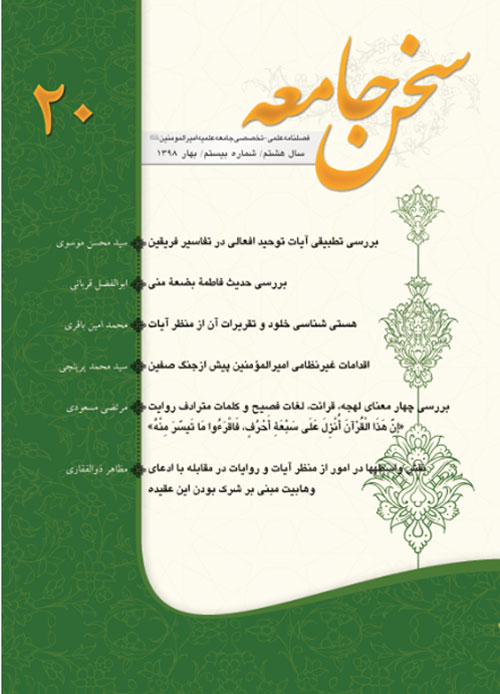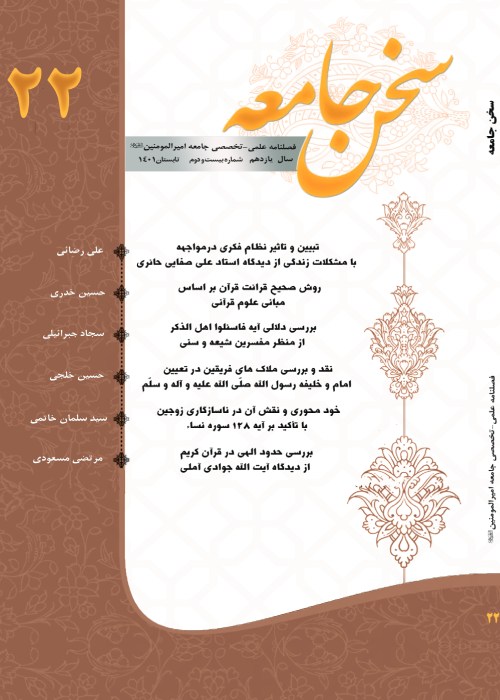فهرست مطالب

فصلنامه سخن جامعه
پیاپی 20 (بهار 1398)
- تاریخ انتشار: 1400/09/10
- تعداد عناوین: 7
-
صفحه 5
-
صفحه 19
-
Page 7
Unity of Divine Acts : It is believed that everything that happens in the world, even the actions of other beings, is the action of God. According to the unity of Divine acts, every action from every being is done by the power and will of God. Muslim scholars have given rational and Qur’anic reasons for the unity of Divine acts. Among them are the verses in which God is introduced as the Creator of all things. Due to their school of thought, the commentators are either compulsive (Jabri), delegated (Tafvizi) or Shiite, so they have various opinions in interpreting the verses of unity of Divine acts, which should be examined. The Ash’arites, considering the unity of Divine acts, do not consider man as an independent being. The Mu’tazilites accept the unity of Divine acts but do not consider the voluntary actions of man as the act of God and attribute them only to man himself. Imami Shiites consider both views to be incorrect and believe that the unity of Divine acts is not incompatible with human free will. They consider the voluntary actions of man in line with the action of God and attribute them to both God and man. Monotheism in creation and monotheism in Lordship are the types of unity of Divine acts and reliance on God and monotheism in worship are the effects of unity of Divine acts.
Keywords: Monotheism, algebra, authority -
Page 19
In this research we will study this noble hadith which has been narrated from the Holy Prophet (peace be upon him and his household). Because throughout Shiite history, from the time of the Holy Prophet of Islam (PBUH) until now, there have been conflicts and disputes over the immediate caliphate of the Prophet (PBUH); So, in this article, we intend to discuss one of the ways that the astray conscious or unconscious enemies of the right Shiite school use against the correct Shiite thinking, that is analyzing the suspicions about Shiites. One of the suspicions that has been recently arisen about the infallibility of our Master Amir al-Mu’minin Ali (PBUH) is appealed from Lady Fatima Zahra, holy Mother of Shites (peace be upon her). The argument is that in order to overthrow the Shiites, the other sect (Sunnies) used a method in which the Shiites, with their own admissions, are defeated and surrender to them. But in the future, God willing, we intend to dispel this suspicion and reveal their black faces by narrations and sayings in this subject and we will reveal the truth. So, there will be a review about Hadith’s document, the sayings of the scholars of the two sects, etc., and it will be proved later by God Almighty’s help that their intention of the hadith is false and irrelevant, and that they intended a false will from a true text.
Keywords: Narrtive, Fatema -
Page 27
Every thinking Muslim who studies the Divine revelation (the Qur’an) and thinks deeply on its meanings, definitely, when confronted with the verses of the heaven and the hell, thinks a lot about the immortality of human being therein; then, he can easily accept the heaven and its eternal blessings and considers it compatible with the Grace and Mercy of God, but the immortality of the hell and eternal torment in it may make him think for some days and ask himself “How would God, the Merciful and the Compassionate, provide eternal torment for human beings?” “How can God who loves his servants more than anyone else - even more than a mother to her child - afflict them with torment and the hell, and mention the eternity of that torment?” The present article tries to take a step towards enlightening the eternal torment and reduce some of the ambiguities of the questioning mind; In this regard, we have presented the verses that agree with the theory of eternity and will discuss them. Later, we have discussed different methods of scholars for interpretation of the Qur’an regarding the problem of eternity and added some explanation to each discussion. Of course, the complexity of this issue and its mixing with other issues of theology has prevented the author from stating his opinion
Keywords: Hell, imortal -
Page 39
One of the important historical issues is the study of the civilian actions of Amir al-Momenin before the battle of Seffain, because the explanation of this issue clarifies the character of Amir al- Momenin in terms of being belligerent. This article has been collected by researching the books of historians and historical analysts and by refining and recovering these contents. At the beginning of the article, we mentioned that Amir al- Momenin went to Kufa to pursue the issue of Syria after ending the intrigue of Jamal participants. In his first action, Ali (A.S) sent Qeys, who had a generous and powerful personality, to Egypt, which had a sensitive strategic military position. Because of the sensitivity of Egypt, Amir Almomenin ordered him not to be merciful with the opponents and to go to Egypt with a great army. But Qeys did not go to Egypt with a great army in order for sympathy for the Imam, and when he arrived in Egypt, he did not deal with the opponents and behaved politically. Because of this action and also because of his writings to Mu’awiya, Imam Ali dismissed him. In the second action, Imam sent Abdullah Bajli to Egypt as a mediator. Mu’awiya planned and attracted Sharhbil to himself who had conflicted Jarir before, and sent him to confront with Jarir, which led Jarir not to fulfill his mediation role. In his third act, Imam started a pre-war propaganda and replied Mu’awiyah’s letters, which with impolite words had accused Imam of jealousy. Of course, this propaganda war was not limited to these letters, but other events, such as sending the reciters of Qur’an by Mu’awiyah, also took place in this regard. What is evident from this is that Imam did everything to prevent the war.
Keywords: People kofe -
Page 63
According to the narration of the Prophet: “ This Qur’an was revealed in seven letters, so recite as much of the quran that is feasable, each of which is easier to read”.” Scholars have interpreted this tradition diffrently, here four interpretation (different dialects of synonymous words, eloquent words and different readings) have been examined. These four meanings are discussed in as much detail as possible with the reasons given for these four meanings, and then some answers are given to reject them. We first dealt with this narration in Shiite and Sunni hadith books to make sure that the hadith is strong in terms of document, then we studied the books that dealt with this hadith, and finally we came to the conclusion that none of these meanings match with this hadith and have some problems, and it was very clear that some other meanings that were not taken into consideration had also some problems and there was no need to state them here, in fact here we only discussed the four meanings we mentioned and could be fruitful.
Keywords: Qoran, dialect -
Page 73
Wahhabism, a phenomenon that is operationally newound with ancient doctrin, has caused many differences and doubts in the present age that every concerned person needs to take into consideration because it has caught a large number of Muslims in the mire of their beliefs and their wrld and the hereafter have been looted. Therefore, in the present article, we have first examined the claim of Wahhabism on the subject of recourse, then we have explained it a little, and then we have examined the verses and narrations that indicate Mediators and that those who are close to God are as means. In both sections, we have divided the verses and narrations into two parts, the spiritual mediator and the material mediator, and for each part we have given examples. After examining all the above sections, we have mentioned the rejection of the Wahhabi belief in the discussion of recourse in the conclusion section. The research method in this article is library method and it was collected based on studying the related books. Most of the material has been based on narration and reasoning relyed on narration. It should be noted that the narrations other than the verses, are mainly from the original sources of Sunnis and Shiite sources have only been mentioned in their confirmation.
Keywords: Recourse


